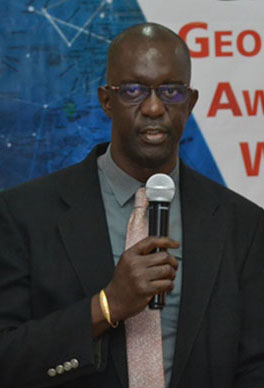No significant progress has been made in the Mainstreaming Sustainable Land Development and Management (MSLDM) project since its launch in January and head of the Guyana Lands and Surveys Commission (GLSC), Trevor Benn, has again blamed the Food and Agriculture Organisation (FAO) for the delay.
“Let me be very blunt. The situation has not improved…We are having, as we speak, very contentious conversations with the FAO in relation to the implementation of this project. The funds which were received from the GRIF (Guyana REDD+ Investment Fund) process was handed over to the FAO, I believe, in December 2017. We are in December of 2018 and less than quarter of one percent of what we are supposed to be implementing, has been implemented,” Benn told reporters at the GLSC’s end-of-year news conference on Monday.
His comments come months after the Commission lambasted the pace at which the FAO was implementing the project. Among other components, the US$14.8 million project includes land reclamation and development, implementation of a land classification system, and other requirements to facilitate optimal land utilisation and sustainable land development and management. The funds were earned by Guyana for protecting its forests under a deal with Norway.
Questioned about the status of the project on Monday, Benn said the situation had not improved. He said Cabinet has already approved certain activities under the project and documents were sent to the FAO but they were “still not good enough.”
Despite intervention by the Ministry of Foreign Affairs, the communications were deemed to be “not good enough” and, as a result, no significant progress has been made, he said, while pointing out that this is hindering some operations of the Commission.
“And so I believe there is a kind of system where, when you are a poor country, these UN (United Nations) agencies treat you in one way, and when you are a rich country, you get another treatment because I have worked with the UN and I have seen, in fact, under another dispensation in Guyana that would have never happened. I’m telling you, I’ve seen it at work. Under another dispensation in Guyana, that would not have been allowed. I have seen one-sentence letters written to UN agencies in which they did things differently after that one-sentence letter. With this government, it seems as if it is not working,” Benn said.
He disclosed that officials have scheduled a Skype call with the FAO’s head office today and they are going to wait until they have that conversation to make a decision on their next move. Benn emphasised that the slow implementation of the project is hindering training for GLSC staff at the University of Guyana for a professional diploma in Land Administration and Management. He said that the Commission has already paid $40 million which is supposed to be refunded by the MSLDM project.
“The Commission with its very scarce resources advanced money to the university and we are not able to get it back from the FAO,” he lamented. Benn said that so far, a total of 20 staff from the Commission along with staff from the Guyana Geology and Mines Commission and the Central Housing and Planning Authority were sponsored to pursue the programme. He also revealed that the GLSC will be seeking to facilitate Guyana’s membership to several key international organisations including the Pan American Institute of Geography and History, and the International Hydrographic Organisation.
According to Benn, the two organisations are well poised to provide technical assistance and capacity building, as well as provide access to a variety of critical resources and expertise that are important to advancing the work of the GLSC in mapping, hydrographic surveying and other critical areas.
It was also disclosed that this year, the GLSC, through the work of the Guyana/Brazil Joint Border Commission, was able to refurbish and re-observe three border markers between Guyana and Brazil and this will continue throughout 2019.
Guyana is also expected to host the 10th Conference of the Joint Border Commission in the first quarter of next year. The GLSC CEO further revealed that in collaboration with the British High Commission, they have signed on to the Commonwealth Marine Economies Programme. This will provide the opportunity to improve the country’s hydrographic capacity, as well as collection and processing of related data for Guyana to be able to capitalise on the benefits derived from its marine resources.






